Discover the Best Board Games for Every Player
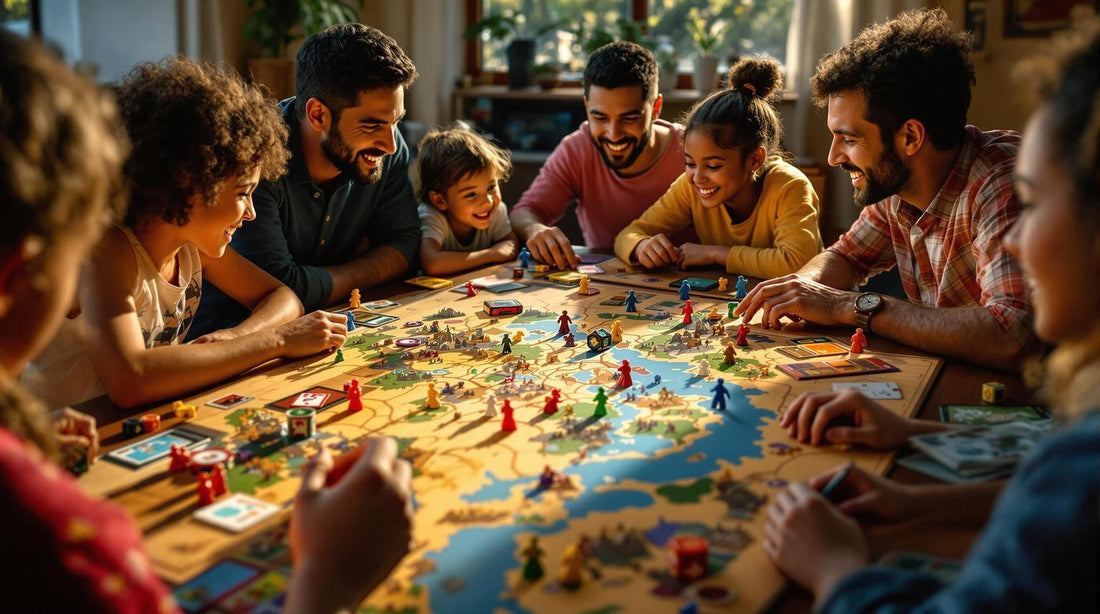
Brain Games for Kids: Top Picks from ICECOOL to Wash Dash
Brain games are more than just fun - they help kids develop critical skills like memory, focus, problem-solving, and strategic thinking. This guide highlights top brain games for children of all ages, including:
- ICECOOL: A physical game that improves spatial reasoning and fine motor skills for kids 6+.
- MentalUP Brain Games: A digital platform with 150+ games to boost memory, attention, and analytical thinking for ages 4–13.
- Wash Dash: A card game teaching pattern recognition, planning, and time management.
- Brain Games Kids Mobile App: A collection of 32 games focusing on math, memory, and logic skills.
- Games for Ages 4 and Up: Simple games like Memory Match and Tangrams for younger kids to build foundational cognitive abilities.
Each game offers unique benefits, ensuring kids stay engaged while learning. Whether physical or digital, these games are designed to challenge young minds and support their growth.
1. ICECOOL
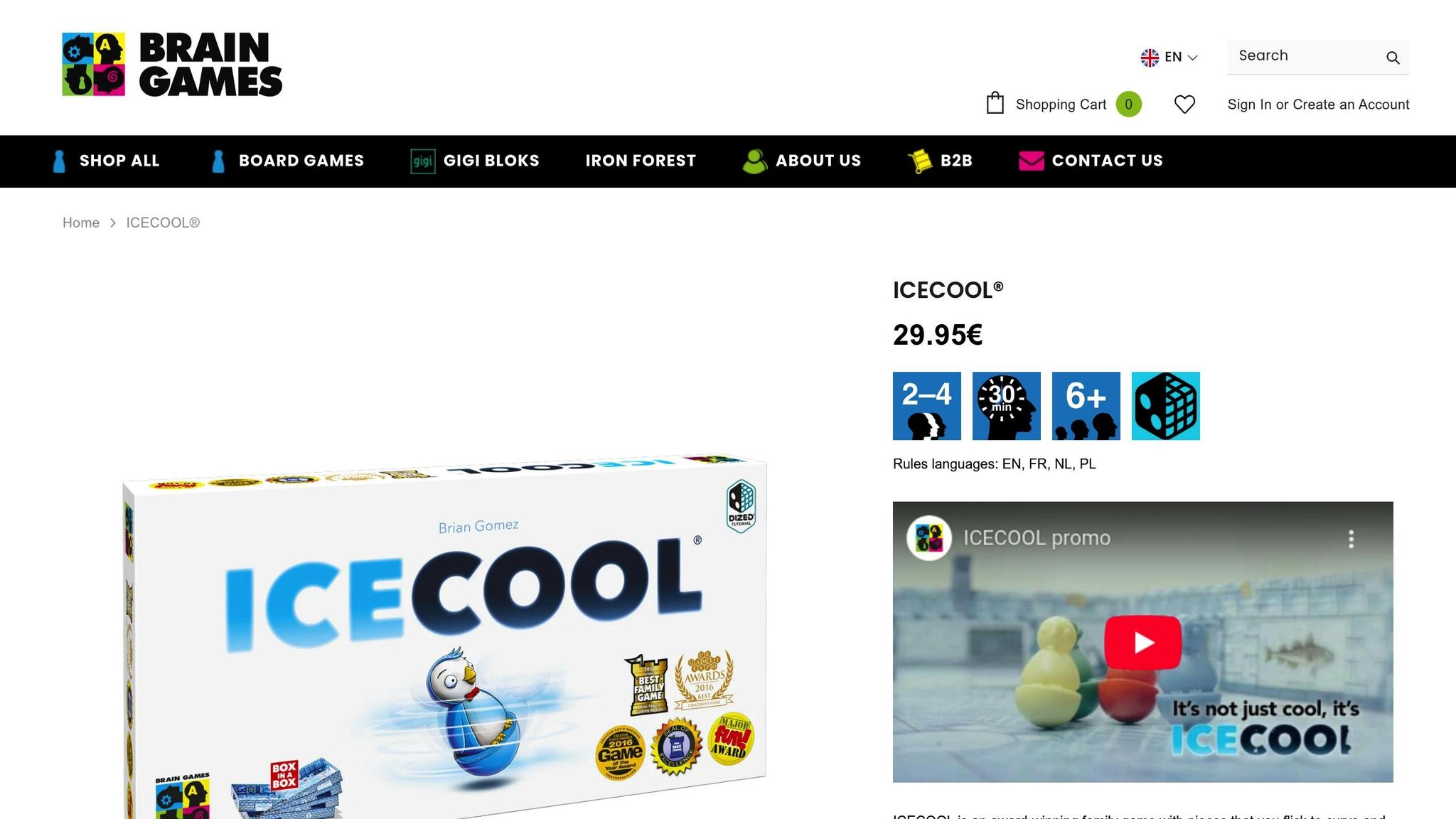
Age Suitability
ICECOOL is designed for children aged 6 and older. Ryan Billingsley from Dad Suggests shares his thoughts:
"Generally speaking, I think this is a pretty accurate age recommendation. Younger kids could definitely play together and would love messing around with this game - and our son could certainly play before he was 6. But at 6 years old he's a formidable opponent even for us".
Skills Kids Can Build
Playing ICECOOL helps kids develop several important skills:
- Spatial Reasoning: Players figure out how to maneuver penguins through 3D spaces.
- Fine Motor Skills: The flicking mechanics demand precise finger control.
- Strategic Thinking: Anticipating opponents' moves and planning ahead is key.
- Basic Physics Concepts: Kids learn about force, angles, and momentum while playing.
How the Game Works
ICECOOL is easy to set up thanks to its clever box-in-box design. The game splits players into two roles:
| Role | Objective | Key Strategies |
|---|---|---|
| Runners | Collect fish tokens | Dodge the hall monitor and move quickly through doorways. |
| Hall Monitor | Catch other penguins | Block pathways and predict other players' moves. |
Each penguin has a weighted base, making its movements unpredictable. Players use different flicking techniques to control their penguins:
- Straight shots by flicking directly.
- Curved paths by hitting the side of the penguin.
- Jump shots by flicking the penguin's head.
These mechanics create fast-paced, exciting gameplay.
Why It’s Fun to Play Again and Again
The mix of skill and unpredictability keeps ICECOOL fresh. Alex Singh from iSlaytheDragon describes the experience:
"Penguins spin and careen all over the place and seemingly have a mind of their own. Getting your penguins across a room much less through a doorway is challenging; I am terrible at ICECOOL".
The game’s replayability comes from skill improvement, varied setups, and the option to combine it with ICECOOL2 for larger layouts and up to 8 players. Every session offers new challenges and surprises.
ICECOOL Board Game Review - The Best Dexterity Game
2. MentalUP Brain Games
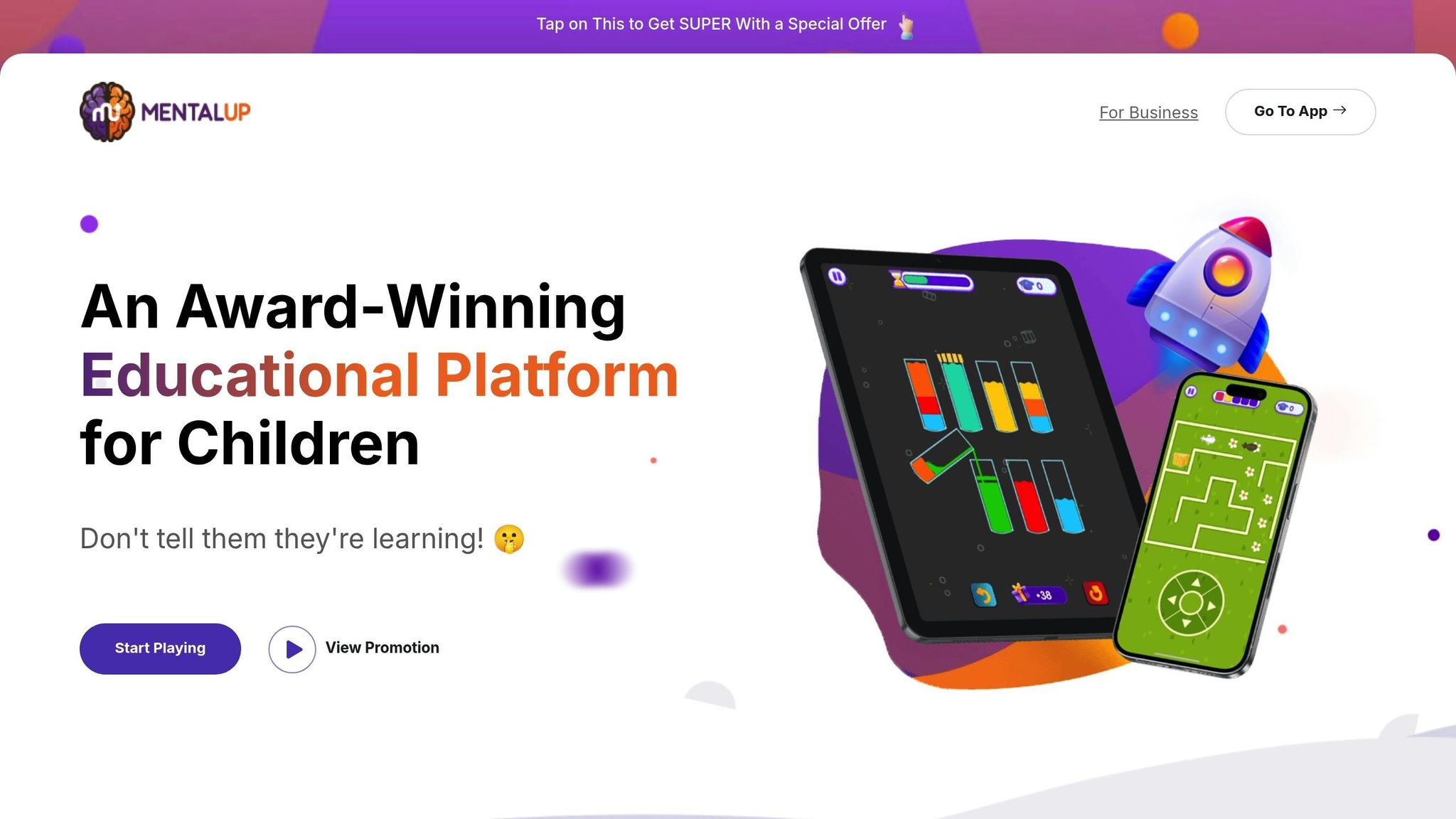
MentalUP Brain Games offers a digital way to challenge kids' cognitive skills, providing an engaging alternative to physical games like ICECOOL. Its real-time adjustments ensure every child faces challenges suited to their abilities.
Age Suitability
MentalUP is designed for kids aged 4-13, with difficulty levels tailored to their age and progress through adaptive algorithms.
Cognitive Skills Developed
MentalUP uses scientifically designed games to help children improve in five key areas:
| Cognitive Area | Skills Targeted | Activities Used |
|---|---|---|
| Memory | Retention and recall | Brain training exercises |
| Visual Intelligence | Spatial reasoning, pattern recognition | Visual puzzles and games |
| Analytical Thinking | Problem-solving, logic | Strategic challenges |
| Attention | Focus, concentration | Attention-specific tasks |
| Language Skills | Vocabulary, verbal fluency | Language-based games |
These activities complement the benefits of traditional board games while adding a digital edge. MentalUP's educational value has been recognized with the EVIDENCE of IMPACT Award from University College London.
Gameplay Mechanics
With over 150 games and 240 exercises, MentalUP keeps sessions short - just 20 minutes a day - to avoid excessive screen time.
Some key features include:
- Adaptive Learning: Games adjust based on how the child performs.
- Progress Tracking: Parents and teachers can monitor skill development.
- Varied Content: Covers language, math, science, and other cognitive skills.
- Reward System: Points and achievements keep kids motivated.
Engagement and Replayability
MentalUP’s gamified design has earned high ratings: 4.7/5 (32.2K ratings) on the App Store and 4.3/5 (144K reviews) on Google Play.
Candice A., a teacher, shares her experience:
"MentalUP is a useful application that enhances the mental skills our students and teachers enjoy using. Particularly with the contributions to attention development, our students have gained a significant boost in their success in academic lectures".
With 15 million users worldwide, MentalUP also aligns with the UK curriculum, as verified by the Education Alliance Finland. This makes it a strong addition to classroom learning.
sbb-itb-1ed942f
3. Wash Dash
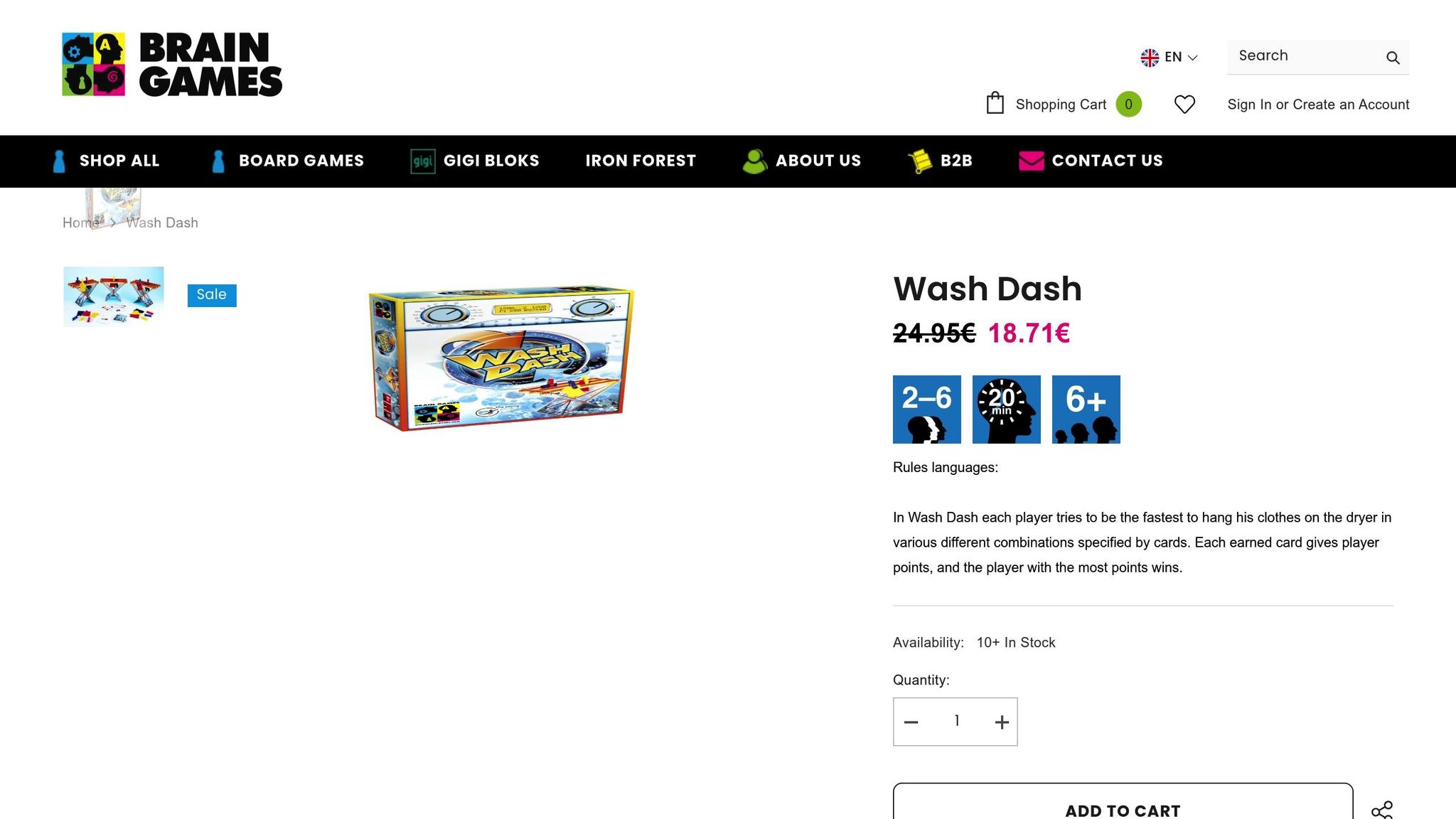
Wash Dash is a brain game designed by schoolchildren aged 12–14 as part of "The Young Can Do It" initiative. It’s a great example of how young minds can create engaging and educational gameplay.
Age Suitability
Although teenagers developed it, Wash Dash’s simple mechanics and easy-to-understand design make it enjoyable for younger players while still offering a mental challenge.
Cognitive Skills Developed
| Skill Area | Skill Focus |
|---|---|
| Pattern Recognition | Matching clothing combinations based on card instructions |
| Strategic Planning | Managing resources and making thoughtful decisions |
| Time Management | Balancing speed and accuracy under time constraints |
Gameplay Mechanics
Wash Dash is a solo card game focused on quick thinking and resource management. The gameplay revolves around three main mechanics:
- Card Management: Players draw cards and choose to discard, flip, or reposition them, each affecting their resources.
- Resource Balancing: Every decision impacts resource levels, requiring careful planning.
- Progressive Narrative: The game unfolds across three chapters, with player choices shaping the storyline.
Engagement and Replayability
With 13 different endings, Wash Dash encourages players to replay and explore new outcomes. Bonus item cards and a dynamic storyline ensure every session feels different and exciting.
4. Brain Games Kids Mobile App
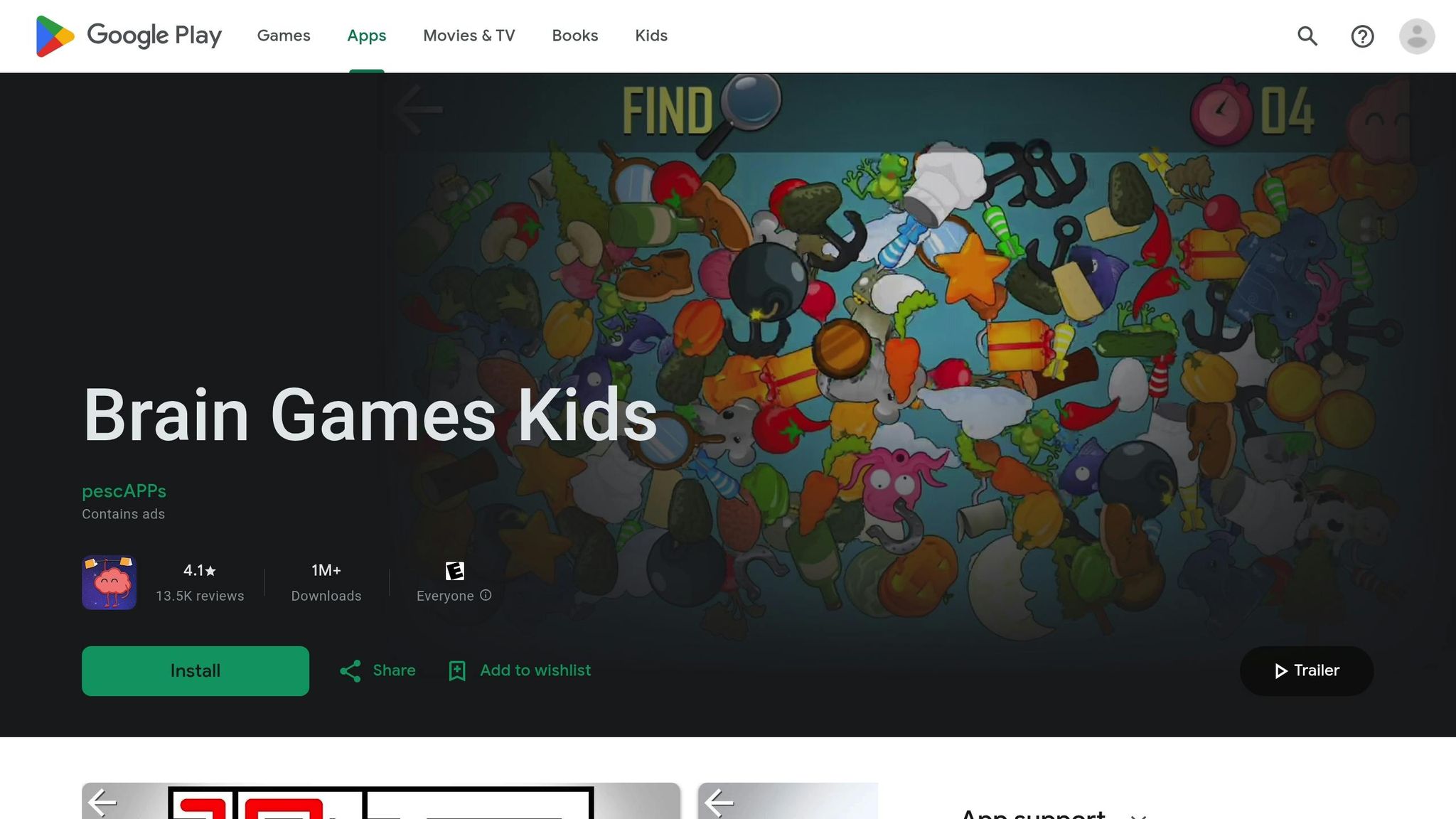
The Brain Games Kids Mobile App brings our popular collection into the digital world, offering 32 engaging games designed to sharpen skills in math, memory, logic, and observation. This app complements our board games, providing fun, on-the-go challenges for young users.
Age Suitability
With its easy-to-use, child-friendly interface, the app is ideal for kids. It offers a smooth transition from traditional board games to digital gameplay, keeping activities accessible and enjoyable.
Cognitive Skills Developed
The app is designed to build essential cognitive skills through targeted activities:
| Skill Category | Focus |
|---|---|
| Math | Builds arithmetic and problem-solving skills |
| Memory | Strengthens retention and recall |
| Logic | Encourages reasoning and strategic thinking |
| Observation | Enhances attention to detail and visual processing |
These games are not just fun - they’re structured to promote learning and skill-building.
Gameplay Mechanics
The app includes daily puzzles and audio stories to keep things fresh. Features like timers, achievement badges, and leaderboards add an extra layer of motivation, driving consistent engagement and progress.
Engagement and Replayability
With regularly updated challenges and a built-in rewards system, the Brain Games Kids Mobile App keeps kids coming back for more. These features make learning an exciting and ongoing experience.
5. Games for Ages 4 and Up
Brain games for younger children need to be straightforward and gradually more challenging, making them suitable for developing minds.
Age Suitability
Games designed for kids aged 4 and up cater to their developmental stages. They include simple rules that adjust in difficulty as children grow, ensuring both younger and older kids can enjoy and learn at their own pace.
Cognitive Skills Developed
Brain games for this age group focus on building essential cognitive abilities. Here's how different types of games contribute:
| Game Type | Primary Skills | Additional Benefits |
|---|---|---|
| Memory Match | Visual Recognition, Memory | Attention to Detail |
| Snake Puzzles | Spatial Reasoning | Fine Motor Skills |
| Tangrams | Geometry Skills | Problem-Solving |
| Logic Balls | Reasoning | Planning, Visualization |
Studies suggest that playing such games can help improve attention spans in young children.
Gameplay Mechanics
These games often combine hands-on interaction with straightforward rules, making it easier for kids to pick up and play. As they progress, the challenges naturally evolve, keeping the experience both engaging and rewarding.
Engagement and Replayability
The best games for young children maintain interest through features like:
- Difficulty levels that adjust as skills develop
- Additional content to introduce new challenges
- Progress tracking to encourage consistent play
These elements not only keep kids entertained but also support ongoing cognitive growth, making brain games a fun and educational choice for long-term development.
Conclusion
Brain games combine learning and fun to support children's cognitive development. Studies show that regular mental challenges can improve learning abilities and skillsets. These findings highlight how diverse brain-game activities contribute to overall mental growth.
Highlights of Featured Games
- ICECOOL: A high-energy physical game designed for kids aged 6 and up.
- Wash Dash: Focuses on pattern recognition and quick decision-making, ideal for older children.
- Memory Match and Snake Puzzles: Adjustable difficulty levels make these great for kids aged 4 and above.
How to Use Brain Games Effectively
Aaron Seitz, Ph.D., professor of psychology and director of the Brain Game Center at the University of California, Riverside, shares:
"If you want to be proactive about brain health, the most consistent advice is to learn a new thing every day. It's the challenge, not just the activity, that's the most important thing".
To get the most out of brain games:
- Spend 10-15 minutes daily on brain game activities.
- Rotate between different games to target various mental skills.
- Track progress to stay motivated.
- Incorporate games into family routines for better participation.
Encouraging Long-term Growth
Consistent practice can lead to lasting benefits when play becomes a habit. Programs like "The Young Can Do It" emphasize how creative game design supports lifelong learning. Ryan Billingsley from Dad Suggests adds:
"Many kids actually learn better when they're moving, and I think it's very fair to say that most kids are more engaged when they don't have to sit still".






